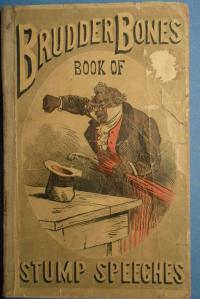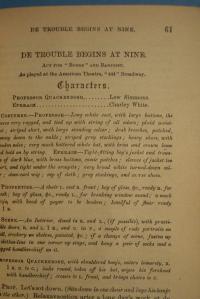“Trouble,” as I may have said once or twice, was Twain’s trademark.
On 11 January 1868, Mark Twain was asked to give a speech (printed in full below) responding to a toast at the Washington Correspondents’ Club. The toast: “Woman, the pride of the professions and the jewel of ours.”

John F. Scott, ed. New York: Dick & Fitzgerald, 1868. Collection of the author.
The speech was well received and widely re-published in newspapers — and also in an 1868 book called Brudder Bones Book of Stump Speeches, and Burlesque Orations, which contains a variety of humorous speeches and sketches from the blackface stage, variety houses and the lecture circuit, all indiscriminately mixed together. Twain, though, is given special recognition in the text, being referred to as “the celebrated humorist.”
While Twain was initially tickled both by his speech and its coverage in the press — and even sent a copy to his own mother, who apparently loved it — he later worried about whether the speech was too vulgar in places. In the various reprints, it would seem that some editors agreed with him, as they omitted bits here and there. Their choices are interesting.
The Washington Star version (13 January 1868), for example, mildly says that Twain “responded” to the toast. It omits an off-color reference to wives cuckolding their husbands and bearing others’ children and an appreciative tribute to Eve in the pre-fig-leaf days.
Brudder Bones, on the other hand, offers that Twain “was called upon to respond to a toast complimentary to women, and he performed his duty in the following manner.” The book changes that “manner” a bit, by striking the final, conciliatory paragraph that puts all “jesting aside” with a toast honoring each man’s mother. Brudder Bones also omits Twain’s stated desire to “protect” women, apparently not seeing this as necessary or appropriate, or perhaps funny. Like the Star, the minstrel show version omits the reference to women’s infidelity and the children that arise from it, but reprints in full the appreciation of Eve, which celebrates female beauty and sexuality.

So . . . the trouble actually began at nine — nine to ten months before Twain’s inspired first use of a variation of the phrase.
And now, let’s take a look at the mild trouble Twain stirred up about women at the Correspondents’ Club, trouble that he felt that “they had no business” reporting “so verbatimly.“ For those who appreciate Twain’s later 1601, this “trouble” will seem tame indeed, but it does have its charms:
**********************************************************
A Speech on Women by Mark Twain
Washington Correspondents’ Club, 11 February 1868
MR. PRESIDENT: I do not know why I should have been singled out to receive the greatest distinction of the evening — for so the office of replying to the toast to woman has been regarded in every age. [Applause.] I do not know why I have received this distinction, unless it be that I am a trifle less homely than the other members of the club. But, be this as it may, Mr. President, I am proud of the position, and you could not have chosen any one who would have accepted it more gladly, or labored with a heartier good-will to do the subject justice, than I. Because, sir, I love the sex. [Laughter.] I love all the women, sir, irrespective of age or color. [Laughter.]
Human intelligence cannot estimate what we owe to woman, sir. She sews on our buttons [laughter], she mends our clothes [laughter], she ropes us in at the church fairs — she confides in us; she tells us whatever she can find out about the little private affairs of the neighbors ; she gives us good advice — and plenty of it — she gives us a piece of her mind, sometimes — and sometimes all of it ; she soothes our aching brows; she bears our children — ours as a general thing. In all the relations of life, sir, it is but just, and a graceful tribute to woman to say of her that she is a perfect brick.1 [Great laughter.]
Wheresoever you place woman, sir — in whatever position or estate — she is an ornament to that place she occupies, and a treasure to the world. [Here Mr. Twain paused, looked inquiringly at his hearers and remarked that the applause should come in at this point. It came in. Mr. Twain resumed his eulogy.] Look at the noble names of history! Look at Cleopatra! — look at Desdemona! — look at Florence Nightingale! –look at Joan of Arc! –look at Lucretia Borgia! [Disapprobation expressed. "Well," said Mr. Twain, scratching his head doubtfully, "suppose we let Lucretia slide."] –Look at Joyce Heth! — Look at Mother Eve! [Cries of "Oh! Oh!"] You need not look at her unless you want to, but [said Mr. Twain reflectively, after a pause] Eve was ornamental, sir — particularly before the fashions changed!
I repeat, sir, look at the illustrious names of history! Look at the Widow Machree! –Look at Lucy Stone! –Look at Elizabeth Cady Stanton! –Look at George Francis Train!2 [Great laughter.] And, sir, I say it with bowed head and deepest veneration, look at the mother of Washington! She raised a boy that could not lie — could not lie. [Applause.] But he never had any chance. It might have been different with him if he had belonged to a newspaper Correspondents’ Club. [Laughter, groans, hisses, cries of "put him out." Mark looked around placidly upon his excited audience and resumed.]
I repeat, sir, that in whatever position you place a woman, she is an ornament to society and a treasure to the world. As a sweetheart she has few equals and no superiors – [laughter]; as a cousin she is convenient; as a wealthy grandmother with an incurable distemper, she is precious; as a wet nurse she has no equal among men! [Laughter.]
What, sir, would the people of this earth be, without woman? They would be scarce, sir — almighty scarce! Then let us cherish her — let us protect her — let us give her our support, our encouragement, our sympathies — ourselves, if we get the chance. [Laughter.]
But, jesting aside, Mr. President, woman is lovable, gracious, kind of heart, beautiful — worthy of all respect, of all esteem, of all deference. Not any here will refuse to drink her health right cordially, for each and every one of us has personally known, and loved, and honored, the very best one of them all — his own mother! [Applause.]
,
1 In 19th C slang, “a perfect brick” was someone who was the “same on both sides,” or “fair, frank, reliable in every way” or “on the square” (George R. Graham, “Origin of Slang Phrases” 1858). Carrying a brick, or wearing a brick in one’s hat meant to be drunk and disorderly, which probably had appeal as resonance in this toast. This helps explain the “great laughter” here, as does the ironic play of the phrase against the humorous aspersions Twain is casting, especially the reflection on women’s virtue that was omitted in most accounts of the speech.
2 Dashing and handsome entrepreneur, speaker, entertainer, and journalist associated with the Susan B. Anthony and Elizabeth Stanton of the Woman Suffrage Movement, which angered their former abolitionist friends because of his stance against black suffrage.
,
© Sharon D. McCoy 12 December 2013
With many thanks to Tracy Wuster, who told me about Brudder Bones, and to Kevin MacDonnell for generously sharing digital photos of the cover and table of contents, and to the Hecklers, for helping me to find a local copy so that I could examine the text fully.
